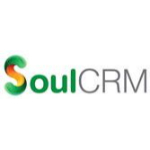List of Best Sales Management Software
Showing 10 of 194 productsCaptainBiz is a software designed to streamline your business operations and elevate your success. With its user-friendly interface features, CaptainBiz empowers businesses of all sizes to efficiently manage tasks, increase productivity, and achieve...Read CaptainBiz Reviews
CrankWheel is a virtual meeting solution designed to revolutionize the way you connect with your clients and colleagues. With its user-friendly interface and seamless integration, CrankWheel streamlines virtual meetings and presentations, making them...Read CrankWheel Reviews
Medico eDSS, the innovative software solution designed to revolutionize medical decision making. With a user-friendly interface technology, Medico eDSS streamlines the process of diagnosing and treating patients, making it a valuable tool for healthc...Read Medico eDSS Reviews
SoulCRM is a customer relationship management software designed to streamline and simplify business processes. With intuitive tools features, SoulCRM empowers businesses to effectively manage customer interactions, boost productivity, and drive growt...Read SoulCRM Reviews
CompanyHub CRM, a powerful tool designed to streamline your customer relationship management process. With CompanyHub, youll have everything you need to effectively manage your leads, contacts, and sales in one organized platform. Say goodbye to scat...Read CompanyHub CRM Reviews
NetHunt CRM is a robust software designed for businesses of all sizes, particularly beneficial for sales and marketing teams who rely on Gmail and other Google Workspace apps for their daily operations. The platform simplifies the customer management...Read NetHunt CRM Reviews
Medico SG is a and user-friendly software designed specifically for medical professionals. With its advanced features interface, Medico SG streamlines daily tasks and simplifies complex processes, allowing doctors and healthcare providers to focus on...Read Medico SG Reviews
Accent Accelerator a revolutionary software designed to help individuals excel in their language proficiency by improving their accent and pronunciation. With advanced technology and expert resources, this powerful program is perfect for those seekin...Read Accent Accelerator Reviews
Acme Insight is a software designed to streamline and simplify business operations. With its powerful features and user-friendly interface, Acme Insight revolutionizes the way businesses manage their processes, saving time, effort, and resources. Sta...Read Acme Insight Reviews
Sub Contracting Add-On, the latest addition to our software solutions. This feature allows businesses to efficiently manage sub-contracting tasks, saving time and increasing productivity. With its user-friendly interface and seamless integration, Sub...Read Sub Contracting Add-On Reviews
- What Is Sales Management Software?
- Top Reasons Why Businesses Need Sales Management Software?
- What Are the Top Key Features of Sales Management Software?
- What Are the Top Benefits of Sales Management Software?
- What Are the Steps to Choose the Right Sales Management Software?
- What Are the Types of Sales Management Software for Different Industries?
- What Are the Technology Trends for Best Sales Management Software?
- What Are the Deployment Options for Sales Management Software?
What Is Sales Management Software?
Sales management software is a software solution specifically developed to enhance the efficiency and effectiveness of sales processes within firms.
Common functionalities of this software encompass tasks like as generating invoices, monitoring customer orders, organizing customer information, generating analytical reports, and a variety of additional capabilities. The online sales management system is specifically developed to enhance operational effectiveness in the context of sales procedures for organizations.
Sales management automation has the capability to streamline several tasks, including but not limited to, monitoring client orders, pursuing outstanding invoices, tracking potential prospects, and other related activities. Consequently, this practice results in a reduction of both time and financial resources for the organization, while concurrently mitigating the likelihood of human errors.
Moreover, the utilization of online sales management software can facilitate the generation of more precise sales predictions, the recognition of patterns in client data, and the enhancement of organizations' ability to make well-informed choices regarding financial matters.This type of software can facilitate the monitoring of client interactions and the cultivation of enhanced commercial partnerships.
In brief, sales management software facilitates the automation of sales operations and enables organizations to make more informed decisions regarding financial strategy. The utilization of this instrument is crucial for enterprises aiming to optimize their sales and optimize resource allocation.
Top Reasons Why Businesses Need Sales Management Software?
1) Automated Forecasting - Sales management software has the capability to employ predictive algorithms in order to effectively leverage data for the purpose of precisely predicting future sales.
2) Performance Tracking - The online sales management system facilitates the monitoring of both individual and team performance, thereby providing managers with readily available data to establish objectives and evaluate advancement.
3) Lead Qualification - The best sales management software provides a range of features that enable the qualification of leads based on certain criteria, subsequently assigning them priority levels.
4) Data Analysis - An online sales management software facilitates the aggregation of data from several sources and then delivers it in a format that is readily comprehensible for managerial data analysis.
5) Opportunity Management - The online sales management system plays a crucial role in the prioritization and efficient administration of opportunities. Its primary function is to guarantee that each opportunity receives the necessary attention and resources for effective handling.
6) Automated Reporting – An automated reporting system has the capability to automatically generate reports that may be utilized for the purpose of conducting analytics and facilitating decision-making processes.
7) Cost Control - Sales management software plays a crucial role in promoting cost-effectiveness by meticulously monitoring all sales-related operations that have the potential to impact a company's financial performance.
8) Pipeline Visibility – The best sales management tools provide a means to gain insight into the existing pipeline of potential sales possibilities, with the purpose of identifying patterns, conducting analysis, and facilitating informed decision-making.
9) Automated Lead Distribution - Sales management software has the capability to effectively allocate leads to appropriate sales representatives based on predetermined criteria.
10) Sales Resource Planning - The online sales management system facilitates the efficient planning, allocation, and management of resources by managers, enabling them to optimize the utilization of available resources.
11) ROI Analysis - An online sales management software facilitates the effective and precise evaluation of return on investment based on predetermined benchmarks.
12) Quoting & proposals – This system automates the procedure of producing precise quotations and customized proposals for clients.
13) Consolidated Data – Sales management software integrates data from customer relationship management (CRM), enterprise resource planning (ERP), and other relevant programs to establish a cohesive and centralized data structure.
14) Sales Process Assistance – The implementation of the best sales management tools and the provision of guidance to sales agents are crucial for the optimization of operations and adherence to best practices.
15) Automated Notifications – The implementation of automation systems and the provision of guidance to sales agents are crucial for the optimization of operations and adherence to best practices.
What Are the Top Key Features of Sales Management Software?
1. Lead and Contact Management: Top sales management software is a technological solution that facilitates the automation and monitoring of sales leads and contacts. The aforementioned functionalities encompass contact profile management, information retrieval, and monitoring of client interactions.
2. Sales Analytics and Reporting: The collection and analysis of sales data are conducted in a secure manner to furnish sales teams with immediate insight into the overall efficacy of sales endeavors. This facilitates the enhancement and streamlining of sales methods.
3. Automated Processes: Automated procedures have the capacity to optimize sales operations by streamlining tasks and mitigating the occurrence of manual errors. This encompasses characteristics such as task automation, the implementation of automated workflows, and the monitoring of processes.
4. Scheduling and Calendaring: The inclusion of scheduling and calendaring functionalities facilitates the efficient organization and coordination of customer meetings, sales calls, and events. This encompasses functionalities such as the ability to schedule appointments, classify occurrences into categories, and receive automated notifications.
5. Collaboration Tools: Collaboration technologies facilitate the exchange of prospects, ideas, and resources among members of a sales team. The aforementioned features encompass integrated messaging functionality, document-sharing capabilities, and online discussion platforms.
6. Forecasting and Opportunity Tracking: Sales pipeline tools are utilized to monitor and evaluate performance metrics, as well as predict and anticipate potential business prospects. The aforementioned functionalities encompass the ability to monitor the progress of sales stages, generate personalized dashboards, and establish thresholds and reminders.
What Are the Top Benefits of Sales Management Software?
The top benefits of online sales management software are:
1. Improved Efficiency: The online sales management system enables sales teams to effectively monitor and manage customer inquiries, interactions, proposals, and pertinent information in a systematic and centralized manner.
The utilization of this technology optimizes time efficiency and diminishes the need for manual data entry, facilitating the effective administration of sales procedures and enabling individuals to concentrate on finalizing transactions.
2. Automation: Cloud-based sales management software enables sales teams to effectively monitor and manage customer inquiries, interactions, proposals, and pertinent information in a systematic and centralized manner.
The utilization of this technology optimizes time efficiency and diminishes the need for manual data input, facilitating the effective administration of sales procedures and enabling individuals to concentrate on finalizing transactions.
3. Accurate Reporting: The best sales management software offers immediate access to data on the effectiveness of marketing initiatives, crucial performance indicators, and the overall performance of the sales staff. This functionality allows managers to monitor and assess progress, hence facilitating more informed decision-making.
4. Streamlined Customer Relationship Management (CRM): Sales management software offers a consolidated platform for the storage and organization of client information, communication records, proposals, notes, and various other forms of customer data.
This enables sales teams to allocate priority to customer relationships and enhance the entire customer experience management.
5. Improved Team Collaboration: The best sales management tools facilitate real-time communication, document sharing, updates, and customer request handling for teams. This practice facilitates improved collaboration and augments the performance of teams.
6. Enhanced Analytics: Top sales management software offers robust analytics and reporting functionalities, enabling teams to meticulously examine client trends, pinpoint areas for enhancement, and evaluate their progress in achieving predetermined objectives.
What Are the Steps to Choose the Right Sales Management Software?
1. Identify the Business Needs: The initial stage in the process of choosing an appropriate cloud-based sales management software entails the identification of the specific requirements of the firm. What are the primary objectives of the business? What categories of activity necessitate monitoring and documentation?
2. Evaluate Available Solutions: After the organization has determined its requirements, it should proceed to assess the existing options available in the market. In order to ascertain whether the top sales management software packages align with their requirements, it is imperative for individuals to carefully evaluate the many features they offer.
Furthermore, it is important to consider the financial implications associated with the acquisition of the software.
3. Research Solutions: The subsequent phase entails conducting a comprehensive investigation of the best sales management tools that are currently accessible. This entails perusing user reviews, conducting research on client testimonies, and familiarizing oneself with the organization and its products.
Acquiring knowledge about the organization and its software will facilitate the process of choosing the appropriate solution.
4. Determine Budget: The subsequent phase involves the establishment of a financial plan for the software. It is vital to consider the diverse expenses linked to the program, encompassing the initial purchase cost, expenses related to modification, setup, maintenance, and fees associated with training.
5. Compare Features and Pricing: After the establishment of the budget, it is imperative for businesses to engage in a comprehensive analysis of the features and pricing offered by the various available options. It is imperative to consider not just the salient characteristics of the software, but also its usability.
In addition, it is imperative to do a comparative analysis of the integration capabilities of each solution with pre-existing systems, as well as the extent of customer support provided by each solution.
6. Test the Software: Prior to reaching a conclusive determination, it is advisable for businesses to conduct a small-scale trial of the program. This will enable individuals to assess the extent to which the product aligns with their requirements and make a determination regarding its value as a financial commitment.
7. Finalize a Decision: Ultimately, it is imperative for firms to arrive at a conclusive determination regarding the best sales management software that aligns with their specific needs and requirements. Upon completing the aforementioned processes, individuals should get a sense of assurance in their decision-making process.
What Are the Types of Sales Management Software for Different Industries?
There exist a diverse range of top sales management software solutions that are specifically designed to cater to the unique requirements of many industries, including but not limited to retail, e-commerce, wholesale, manufacturing, finance, and professional services.
Each type of software offers different features and capabilities to meet the unique needs of different industries:
1. Retail Sales Management Software: Cloud-based sales management software facilitates the management of inventory, orders, billing, payments, and customer relationship management (CRM) operations for retail stores.
The typical components encompassed within this system consist of modules designed for the purpose of order processing, merchandising, promotions, and returns.
2. E-Commerce Sales Management System: This particular software enables enterprises to establish and oversee their individual electronic commerce websites.
This particular program encompasses several functionalities, such as the ability to facilitate the checkout process, handle payment management, manage products, and provide additional analytical tools.
3. Wholesale Sales Management Software: The best sales management tools are specifically developed to facilitate pricing, order fulfillment, and supplier management processes. Additionally, the utilization of this technology can assist firms in monitoring consumer interactions and optimizing operational processes.
4. Manufacturing Sales Management System: This particular program is designed to prioritize the process of order fulfillment, effectively manage inventories, ensure quality control, and facilitate production planning.
The implementation of this solution has the potential to enhance operational efficiency by streamlining production processes and optimizing inventory levels.
5. Finance Sales Management Software: This particular program facilitates financial management for firms, encompassing tasks such as billing, accounting, invoicing, and collections.
6. Professional Services Sales Management Software: This software is specifically developed to facilitate sales tracking, sales forecasting, customer relationship management (CRM), and lead generation. Furthermore, this practice aids organizations in gaining a deeper comprehension of their industry dynamics and effectively strategizing their client targeting efforts.
What Are the Technology Trends for Best Sales Management Software?
The technology trends for best sales management software include:
1. In-depth analytics: The significance of analytics in the realm of the best sales management tools is steadily expanding. These analytics offer valuable insights into consumer data, sales key performance indicators (KPIs), and other crucial variables, enabling firms to make well-informed decisions grounded in empirical evidence.
2. Automation: The adoption of automation in sales processes is gaining popularity due to its ability to minimize manual labor and enhance productivity for sales teams. Automation can involve a wide range of tasks, spanning from the provision of automated reminders for sales representatives to the implementation of computerized billing and shipping processes.
3. Mobile applications: Mobile applications offer a streamlined solution for sales teams to effectively oversee their sales activities while on the move, hence enhancing productivity and facilitating centralized access to essential data and information.
4. Secure Cloud Hosting: Numerous organizations specializing in sales management tools are currently utilizing cloud technology as a means to securely store client and sales data. Cloud storage offers a highly effective storage solution for data, enabling users to access it conveniently from any location and at any time.
5. AI-powered chatbots: The integration of AI-powered chatbots into online sales management software has gained significant popularity due to their ability to enable sales teams to deliver round-the-clock customer service, support, and sales help.
What Are the Deployment Options for Sales Management Software?
Sales management software can be deployed using many approaches, namely on-premise, cloud-based, and hybrid installations.
1. On-premises solutions necessitate firms to procure, deploy, and uphold the software and accompanying gear within their physical premises.
2. On the other hand, cloud-based sales management software is hosted and managed at a remote location by a third-party supplier.
3. Hybrid installations involve the integration of a dedicated on-premise server with a cloud-based solution. Hybrid systems offer more configuring ability, hence enabling greater flexibility.
However, their implementation may necessitate supplementary initial expenditures and/or continuing maintenance charges.










